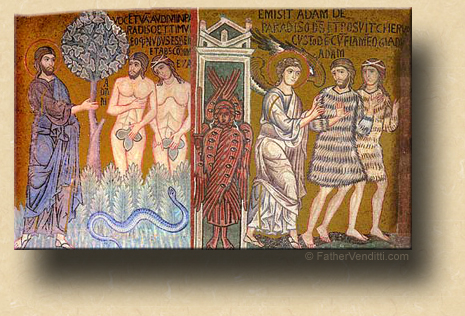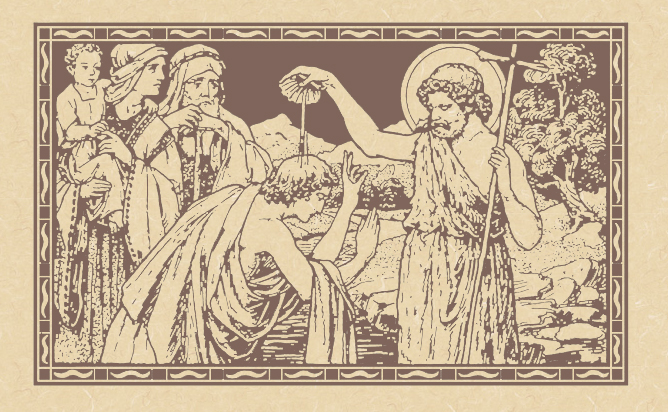Giving God His Due.
The Third Thursday of Advent.
Lessons from the feria, according to the ordinary form of the Roman Rite:
• Isaiah 54: 1-10.
• Psalm 30: 2, 4-6, 11-13.
• Luke 7: 24-30.
Lessons from the dominica,* according to the extraordinary form of the Roman Rite:
• Philippians 4: 4-7.
• Psalm 79: 2-3, 6.
• John 1: 19-28.
The Thirtieth Thursday after Pentecost, the Fifth of Philip's Fast; the Feast of the Holy Martyr Eleutherius; the Feast of Our Venerable Father Paul of Latra; and, the Feast of Our Holy Father Stephen, Archbishop of Surozh.**
Lessons from the pentecostarion, according to the Ruthenian recension of the Byzantine Rite:
• James 1: 19-27.
• Mark 9: 10-16.
FatherVenditti.com
|
 10:05 AM 12/15/2016 — Yesterday we read about the two envoys John the Baptist sent to question our Lord. I offered you the daring supposition that John had sent them not so much to satisfy his own curiosity, but to cure them of projecting their own preconceptions and anxieties onto whomever they had imagined our Lord to be. Today’s Gospel lesson is the followup, part of which was reproduced for us by Saint Matthew in the Gospel lesson from last Sunday. The theme we discussed then was the subject of courage, the one word so pointedly found in all three of the Scripture lessons from that day, culminating is our Lord’s dramatic line, found also in today’s account: “What did you go out to the desert to see—a reed swayed by the wind?” (Luke 7: 24 RM3). And we talked about how there are two kinds of people in this world, spiritually speaking: cowards and heroes: the hero is not afraid to look into the mirror of his conscience, confront the sins and imperfections within him, and ask our Lord for the grace of forgiveness, all of which requires that he throw off the yoke of pride. 10:05 AM 12/15/2016 — Yesterday we read about the two envoys John the Baptist sent to question our Lord. I offered you the daring supposition that John had sent them not so much to satisfy his own curiosity, but to cure them of projecting their own preconceptions and anxieties onto whomever they had imagined our Lord to be. Today’s Gospel lesson is the followup, part of which was reproduced for us by Saint Matthew in the Gospel lesson from last Sunday. The theme we discussed then was the subject of courage, the one word so pointedly found in all three of the Scripture lessons from that day, culminating is our Lord’s dramatic line, found also in today’s account: “What did you go out to the desert to see—a reed swayed by the wind?” (Luke 7: 24 RM3). And we talked about how there are two kinds of people in this world, spiritually speaking: cowards and heroes: the hero is not afraid to look into the mirror of his conscience, confront the sins and imperfections within him, and ask our Lord for the grace of forgiveness, all of which requires that he throw off the yoke of pride.
Today’s lesson picks up where yesterday’s left off: the two emissaries of John having left to make their report, our Lord uses the occasion of their brief visit to expound a little about His Forerunner. It’s all pretty much the same as we heard last Sunday in Matthew, except for one curious addendum added by Luke. You’ll recall, back on the feast of Saint Luke, how we observed that this particular Evangelist, being a physician and something of a first century psychiatrist, often gives us insights—his own, of course—about what people were thinking or feeling when they met our Lord. In this case, he mentions that all the people who had been baptized by John but who were now following Jesus, had no difficulty accepting what our Lord told them, but that those Pharisees and scholars who had not accepted baptism by John were the only ones who rejected it.
Now, we must be clear: we’re not talking here about a lack of sacramental grace, because John’s baptism was not a sacrament. None of the sacraments as we know them had yet been instituted by our Lord. John’s baptism was purely symbolic of a desire on the part of those who received it to acknowledge their sins and ask God’s mercy for them. But it does make sense that the ability to hear our Lord’s words and accept them is concomitant with the courage and humility necessary to see ourselves as we really are. And lest we misunderstand the point being made by Saint Luke in his little psychological epilogue to this episode, he is not drawing a broad line between good and evil; he makes it clear, in fact, that there were grave sinners among those who had been baptized by John, but who now accepted what he calls “the righteousness of God” (v. 29 RM3).  Msgr. Knox, in his translation, throws clarity on what’s really happening: “It was the common folk who listened to him, and the publicans, that had given God his due, by receiving John’s baptism, whereas the Pharisees and lawyers, by refusing it, had frustrated God’s plan for them” (vs. 29-30 Knox). Msgr. Knox, in his translation, throws clarity on what’s really happening: “It was the common folk who listened to him, and the publicans, that had given God his due, by receiving John’s baptism, whereas the Pharisees and lawyers, by refusing it, had frustrated God’s plan for them” (vs. 29-30 Knox).
What the Roman Missal has translated as accepting “the righteousness of God,” Msgr. Knox has simply rendered as “giving God his due,” which expresses it perfectly: by acknowledging our sins and admitting that we can’t overcome them without Grace, we are simply giving God His due. Go back to our discussion of Original Sin on the feast of the Immaculate Conception: what is the essence of Original Sin as symbolized by the metaphor of eating the fruit off the Tree of the Knowledge of Good and Evil? It’s the desire to be God, the desire to decide for myself what’s right and what’s wrong, and is the root of every sin ever committed since on the face of this earth. It’s more than just an original sin; it’s really, when you think about it, the only sin, just with many variations.
What’s most important of all to notice, I think, is the little observation Luke makes in the very last line of the lesson: that by refusing John’s baptism—that is, by refusing to confess their sins and ask for God’s help—the Pharisees and scholars “had frustrated God’s plan for them.” What a perfect way Msgr. Knox puts it. Since the fall itself—indeed, from all eternity—God had carefully and brilliantly crafted the means of our salvation; nothing was left to chance, nothing could go wrong. He even contrived to come to earth Himself in the person of Jesus to pay the penalty of death and so assure man’s redemption. But, He had created man in the beginning with a free will, and wasn’t going to take it back; thus, there was one thing remaining that could frustrate that plan: man’s rejection of it. It’s symbolized in today’s lesson by the Pharisees and scholars who refused John’s baptism; it becomes real now every time we refuse to confess our sins and ask for God’s help, for God’s Grace, in overcoming them.
In just a few days the first part of Advent, which has focused our attention on the final judgment, comes to a close, and the days of the Greater Antiphons begin, which are focused more properly on preparing us to celebrate the birth of our Lord. Apart from Lent, there is no more appropriate a time to examine our consciences and confess our sins, and that task can be made easy by simply realizing that, but doing so, we are doing nothing more than giving God His due.

* In the extraordinary form, on the ferias of Advent, the lessons are repeated from the previous Sunday unless displaced by a feast or an Ember Day.
** Cf. the first paragraph of the first footnote attached to the post here for an explanation of Philip's Fast. Today is the fifth Thursday because the season began on a Tuesday.
Eleutherius, born in Rome, was consecrated Bishop of Illyricum, where he converted a great many pagans. He was martyred with his mother by Emperor Hadrian (117-138).
Paul of Latra was a tenth century hermit in Greece who was a spiritual teacher and director of many monks.
Saint Stephen the Confessor, Archbishop of Surrentium (Sourozh) in the eighth century, was a native of Cappadocia and was educated at Constantinople. After receiving the monastic tonsure, he withdrew into the wilderness, where he lived for thirty years in ascetic deeds. Patriarch Germanus of Constantinople heard of Stephen’s humility and virtuous life, and wished to meet him. He was so impressed with Stephen that he consecrated him bishop of the city of Surrentium (presently the city of Sudak in the Crimea). Within five years, Saint Stephen’s ministry was so fruitful that no heretics or unbaptized pagans remained in Surrentium or its environs.
|

